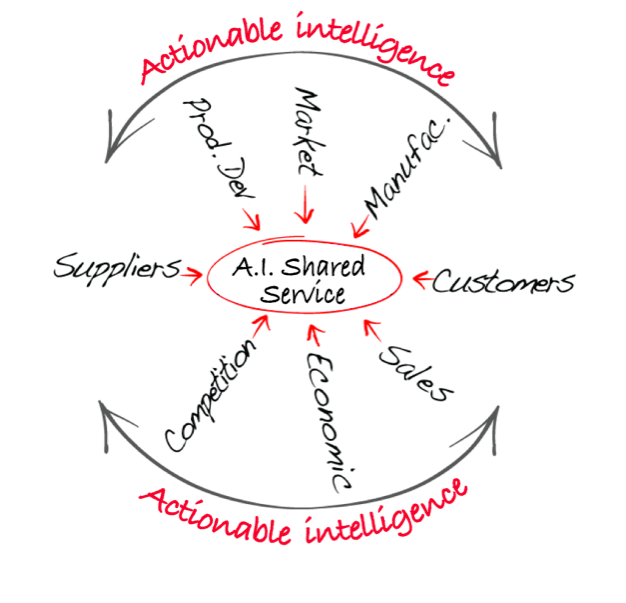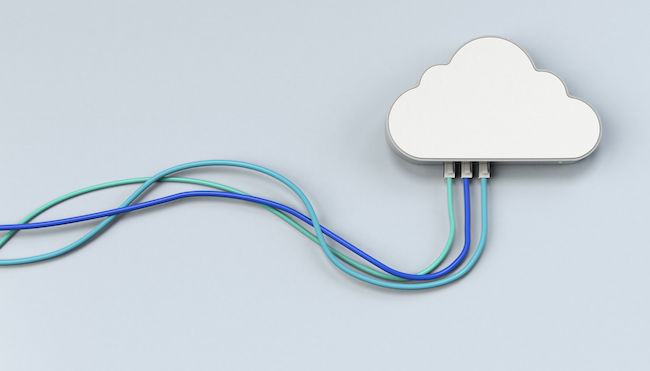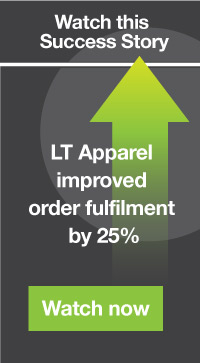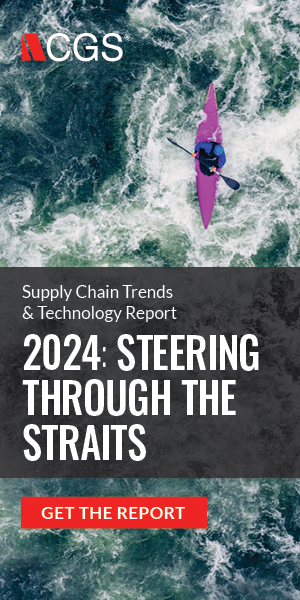Buyer's Guide: The 8 Must-Haves of an ERP System

ERP systems have numerous components, functions and ways to be deployed.
When it’s time to select the Enterprise Resource Planning (ERP) system that will support your business operations in the fashion, apparel, footwear and accessories industry, finding the right ERP system for your needs can be a daunting task. Don’t get bogged down by the endless options; in fact, we would argue that there are only eight critical functions to consider.
In our recent survey of over 100 key influencers in the fashion and apparel industry, 25 ERP Trends Shaping the Fashion and Apparel Industry Report, we learned what decision-makers consider to be the eight “must have” requirements for a successful ERP selection.
1. Process Integration

For apparel companies, this means knowing the status of all of your orders, their production schedule and the fastest, most economical supply chain path to get them to your customer – whether that’s a demanding retailer or consumer. Your in-house business processes and global supply chain operations should also be centralized and integrated enough to manage critical business transactions, including everything from customer orders to deliveries, planning to production and raw materials to finished products, as well as everything in-between.
In the past, the apparel industry typically worked on only two- or four-season cycles, but now consumer expectations require a continuous flow of merchandise throughout the year.
People used to shop less frequently,” says Linda Fargo, the senior vice president of famed New York department store Bergdorf Goodman. “But now, the consumer is always shopping online or coming back to the store, and they don’t want to see the same thing.
Supporting this need could require more software vendors, more logistics providers, more capital and more merchandising. However, an ERP system that integrates all of this data and produces key decision-making results can provide your company with a streamlined and more agile competitive edge. For this reason and the clear cost-savings, business integration is a primary goal of 37 percent of the respondents to the ERP Trends survey.
According to a recent survey by PricewaterhouseCoopers (PwC), only 18 percent of apparel companies surveyed have removed operational silos in their organizations. Business silos in apparel organizations continue to be one of the biggest barriers to operational performance, effective communication, speed to market and profitability.
By implementing a next-generation ERP system, companies have the ability to automate and integrate internal and external processes to ensure “one version of the truth,” no matter where the information is gathered and stored—thereby eliminating operational silos.
Working from the same database of information, companies are able to make better and more-efficient business decisions, collaborate more effectively, shorten time to market and improve productivity.
2. Actionable Intelligence Capabilities

John Fedele/Blend Images/Getty Images
As an apparel business, you have tons of valuable information, but what do you do with it and what does it all mean? Detailed analytics and rapid report availability is key. The easier the ERP software is for executives and everyday users to transform the data into real actionable intelligence and insight, the easier day-to-day business processes are managed.
The latest ERP systems offer actionable intelligence tools to understand what is happening in the business right now and how you can move forward. It’s one step further than what’s been called business intelligence, which is just the culmination of data. Many organizations are now thinking about how to make the leap from spreadsheet-based data and business intelligence to a more real-time, dashboard-based analytics environment.

In a recent ERP survey, apparel professionals were asked about their strategic goals and areas for improvement and technology investment agendas for 2016. Survey respondents overwhelmingly indicated (92 percent) that they plan to maintain or increase their spending on analytical capabilities.
Now’s the time to use intelligence tools to tap into that rich pool of data, sitting unexamined on your ERP system. The prize? Increased visibility into what actually makes your business tick.”—Thomas Wailgum, ERP and BI: A Match Made in Heaven, If You're in Data Hell, CIO.com
Intelligence and data that are actionable drive better business decisions to improve customer service, profitability and growth.
3. Integrated EDI

If you are a supplier to large retailers, it's likely that you have incurred some form of chargeback due to a non-compliance event, such as an incorrect ASN. Perhaps this is a recurring problem for your business that is driving down your margins and negatively impacting your scorecard performance with your most strategic accounts.
Put simply, mastering retail compliance is becoming crucial for suppliers that want to continue working with retail partners. Suppliers that don't comply with requirements are unlikely to have future opportunities with their retail partners.
Non-compliance can be significantly disruptive to a company’s bottom-line performance, given the unbudgeted cost offsets that are incurred for nonperformance. Even if a company budgets for seemingly inevitable charges, the margins of the business will be negatively impacted.
An ERP with fully integrated and automated EDI capabilities eliminates the need for expensive third-party EDI translation software or services, and ensures that purchase orders, invoices, shipping, inventory and other critical business documents meet retail compliance requirements, while improving relationships and profitability.
4. Verticalization

Caiaimage/Tom Merton/Caiaimage/Getty Images
When embarking on an ERP implementation, it’s essential for your software and service provider to know your business. Every industry has its own requirements; from terminology to specific functionality, and a one-size-fits-all ERP will leave you with many gaps and needed customizations. Customizations are expensive and difficult to maintain over time as system updates are released.
Whether you're in a specialized vertical such as footwear or are a well-known apparel manufacturer, ensure your ERP provider is an industry expert. Start the discussion at a business level and evaluate how a specific ERP solution will be able to help you achieve your specific business needs. Consider the core values of your ERP vendor if you are looking for a true business partner.
5. Cloud Hosting

Atomic Imagery/DigitalVision/Getty Images
If you aren't already using cloud applications consider implementing your ERP in the cloud or replacing some of your legacy systems with more modern cloud-based platforms. Moving to the cloud is one of the top eight strategic goals of respondents to the ERP Trends survey.
In its 2016 ERP Report, Panorama Consulting found that cloud-hosted ERP systems are making the shift from trendy buzzword to industry norm.
The question is no longer about whether or not the cloud trend will continue, but it is instead about which organizations will move in this direction and which ones won’t." Panorama Consulting, ERP Report, 2016
Cloud-hosted ERP has significant cost and operational benefits related to several of the "must-haves" identified and is becoming increasingly more attractive for companies looking to implement an ERP system. Cloud-hosted ERP is rapidly taking market share from traditional on-prem and SaaS-based applications. According to the 2016 IDC Cloud Spending Report, cloud infrastructure investment will top $52 billion by 2019, representing 46 percent of total IT infrastructure spend.
6. Flexibility and Adaptability

PeopleImages/DigitalVision/Getty Images
In the fast-paced world of apparel, every ERP must be flexible enough to support changing business models such as direct-to-consumer distribution strategies, increasing supply chain complexities, social and ethical compliance requirements and growing governmental regulations. Review the areas of your operation, which will likely change in line with market needs on a regular basis. Will the ERP system you select be able to accommodate adjustments to specifications, internal processes, changes in business strategy, industry trends or customer needs?
In today’s competitive landscape, apparel companies experience constant regulatory challenges, pressure to be innovative and expectations for growth," says Daniel Erickson for ERP Focus.
Furthermore, flexible and robust integrated multi-channel planning capabilities can maximize sales and margins by reducing stock-outs and mark-downs. Detailed assortment plans are used to translate the overall plan into the most appropriate and profitable mix for each unique distribution channel, based on specific customer preferences and needs.
In addition, keeping the ERP system running smoothly and supporting users on a daily basis is critical to all phases of your operation. Where will you and your ERP provider's staff be located? Fashion industry operations tend to be global and around-the-clock. Find a true business partner that meets your needs now and as your business evolves and grows.
Questions to ask:
- Will the partner provide managed cloud services so we can worry less about maintenance and support and spend more time focusing on business?
- Can the partner support adding locations, ad-hoc deployments and international expansion?
- Does the partner always include disaster recovery, patch management and systems upgrades?
- Does the partner have verified expertise in level 1 - 3 support for ERP systems?
- Can the partner deliver the highest security tier (level 4) to all of our locations?
7. Mobility

RoBeDeRo/E+/Getty Images
Everyone inside and outside your organization wants the flexibility of working and shopping with their choice of mobile device. Your sourcing team needs to be able to update the ERP system on a tablet while visiting vendors. Your compliance team needs to be able to conduct factory audits on a mobile device. Your sales team needs to be able to engage retail buyers faster, make visually compelling presentations and confirm orders on any device, anywhere, anytime.
74% of top performing companies support the use of mobile applications and technologies, Aberdeen Group Research Report, 2015
Employees and executives need the tools and flexibility of working on-the-go and not be tied to their desks. Your customers want to order your products from their mobile phones and tablets. Mobility is now an imperative for the entire end-to-end product lifecycle. The integration among the ERP, your eCommerce operation, sales applications and other solutions is crucial.
“The apparel industry is changing as fast as technology. And as technology devices and capabilities have grown, mobile and role-based apps are becoming the newest game-changers. Applying them is a logical and crucial step in the apparel maker's evolution; it's hard to find reasons why an apparel manufacturer concerned with its brand wouldn't go mobile." Apparel Magazine
With the advent of Apple Watch and other smart watches, companies and vendors are also exploring how to best deliver ERP application information to wearable devices in 2016 and beyond.
8. Consumerization

Caiaimage/Tom Merton/Caiaimage/Getty
Finally, what does your ERP user interface and experience look like? Is it intuitive and easy to use?
"Although ERP vendors were slow to get on the social media bandwagon, the integration of social networking tools with an ERP system can enable better communication and increase productivity beyond email’s capabilities," observes TEC (Technology Evaluation Centers) in its 2015 report, The Makings of a Great ERP User Experience.
With social networking communication tracking and storage, the data is stored within the context of people’s work, so the information can be better cataloged and organized for later use than is currently possible in an email-centric environment.
TEC, The Makings of a Great ERP User Experience, 2015
ERP vendors are increasingly moving toward making the system module screens work more like social media—Facebook and Twitter style. Social media and customer interaction have more of an impact on business decisions than ever before. Will your sourcing team be able to see the latest Instagram feed, images of your production concepts and adjust their buying to respond to customer feedback? This will require more varied insights and analysis of "big data" to keep you ahead of the fashion curve.
All eight of these ERP functions should be reviewed in your system requirements, software demonstrations and evaluation process. Then, prioritize them based on your business objectives. Keep them in plain sight, and review and revise them as often as necessary during your ERP selection and implementation process.
References
- 25 ERP Trends Shaping the Faction and Apparel Industry
- Why Fashion Continues to Make Up New Seasons
- Gartner and Apparel Magazine Top Tech Trends Report 2016
- CFO - Trend Spotting: ERP in 2016
- CIO - ERP and BI: A Match Made in Heaven, If You're in Data Hell
- CIO - On trend: ERP software gets modern data, mobile and social user interface
- TEC: The Makings of a Great ERP User Experience
- Epicor: ERP and Mobile, Social, and Cloud – New Global Research Findings Revealed
- ERP Focus: 5 rationales for selecting process manufacturing ERP specific to the industry
- Top 10 Predictions for the ERP Industry in 2016


